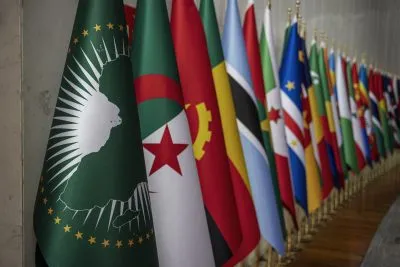Guaranty Trust Bank, or GTBank, as it is known, has had an extraordinary journey. It has some of the strongest metrics of any bank in Africa, let alone Nigeria, and it is respected by all of its peers, which have long tried to emulate its success. It has now embarked on the most significant restructuring in its history.
Segun Agbaje, Group CEO, puts the bank’s success down to setting very clear objectives and what he calls “an obsession” to reach them. “We focus on asset profitability, we focus on ROE, we focus on ROA, we focus on cost-to-income,” he says. The latter for example comes in at 38%, when the industry average is 10 and even more percentage points higher.
However, Agbaje notes, “We’re not driven by wanting to be the biggest, or the bank with the widest footprint. The key focus is to be efficient, and if that means having a smaller balance sheet than some of our rivals, it’s a price worth paying.”
A lot of it, Agbaje adds, is thanks to the culture that was imbued by his predecessors Fola Adeola and the late Tayo Aderinokun. Agbaje should know: he has been at the bank 31 years now, having started when the bank was a fraction of the size it is today.
Non-banking businesses on the way
GTBank has just undergone its most significant restructuring since the banking consolidation effort that took place in Nigeria in 2005. There is now a holding company and underneath it the banking subsidiaries – the Nigerian one, which accounts for a large chunk of its profits, and then Guaranty Trust Bank West Africa, Guaranty Trust Bank East Africa and the UK-based subsidiary.
Non-banking businesses are on the way; amongst them, a payment company that is being built from scratch and an asset management and PFA business, both of which will be the products of an acquisition.
The rationale for this is quite simple, Agbaje explains. “It’s not reinvention for reinvention’s sake. Banks still have a role to play, but things are changing and banks no longer dominate financial services like they used to.”
The banking subsidiaries will still cater for retail and also corporate customers. But payments will become a separate entity that will compete with the fintechs that are operating in that space.
Income from payments currently represents some 30% of banking revenues, but with so many new entrants, including the telcos, the competitive landscape is rapidly evolving.
“By having a separate, more agile entity,” he says, “we will be able to diversify our income base and better compete with emerging competition. This new payments company will be able to do business with other banks and customers. The valuations payment companies are getting are much higher than those of banks – 25 to 30 times earnings.”
The asset management company, he adds, makes sense because right now, when clients want yield, they go to competitors. In addition, the pension funds market in Nigeria has reached such a scale that asset management as a business makes sense.
“Inasmuch as the payments company will be a greenfield project, the asset management business will be through an acquisition,” he reveals.
There are reforms currently taking place in Nigeria whereby asset managers will have to demonstrate a minimum capital base. As a result Agbaje expects some consolidation in the market.
“This is another reason,” he adds, “why the timing for all this is right. If you have the brand and you have the technology and the knowhow, it’s a place where you can pretty much catch up. There are only two or three big players so there’s still scope for another big player.”
Growing as a Group
Agbaje anticipates that by going solo, the payments business will be able to grow by as much as 40%. “We will be able to leverage our network, which has over 24m accounts. Even if only 50% of them are active, that means we have 12m potential customers,” he adds. “You can’t get that if you buy another fintech. We have a starting advantage.”
The current shareholding of the bank won’t change. It’s going to be a one for one swap with the holding company. However, he doesn’t dismiss the possibility of separating one of the businesses and spinning it off on its own if the others are a drag on its valuation.
It is interesting to note that the banking businesses will be organised into regional entities. “Operating through these different entities will bring more autonomy and will enable the regions to focus on improving their returns,” Segun says. “Right now, Ghana for example, is performing much better than the subsidiaries in East Africa. The idea is to bring those up to the same level of profitability.”
The payments platform, however, will be truly international, although the focus in the first year will be growing the Nigerian market. Their experience growing Guaranty Trust continentally has also provided lessons in terms of which markets to enter and how to compete in those markets.
What about regulation? Agbaje accepts that regulation has become stricter, and it is something he feels is normal. “Banks are heavily regulated, which one can understand, and that’s why spinning off the payments platform will enable us to be more agile and compete with peers in that space.”
Change is the watchword
What does Segun Agbaje anticipate the impact of Covid to be on his bank’s results? Last year, he says, the bank had record results. Non-performing loans are not expected to grow significantly and he puts that down to aggressively growing their loan book in previous years, unlike some of their competitors.
The price of oil, also, has picked up from the troughs of 2020 and that always impacts positively on the Nigerian economy. However, his advice, as a banker, is to look at reducing one’s exposure to the sector.
“If I was an investor going into long-term lending or a
Eurobond, I might actually start to insist that you reduce your reliance on that sector… I definitely wouldn’t be putting a lot of patient money in oil and gas.”
Does he study what other banks are doing? “That’s my job,” he explains. “I have just read the latest quarterly report from JP Morgan. You’ve got to track people who are doing stuff well. We look at the South African banks, the international banks.”
As the interview ends he reminds me that if Guaranty Trust has been this successful, it’s because they’re not at a point where they’re satisfied with whatever they might have achieved. A new exciting journey seems to have been set.
Want to continue reading? Subscribe today.
You've read all your free articles for this month! Subscribe now to enjoy full access to our content.
Digital Monthly
£8.00 / month
Receive full unlimited access to our articles, opinions, podcasts and more.
Digital Yearly
£70.00 / year
Our best value offer - save £26 and gain access to all of our digital content for an entire year!
 Sign in with Google
Sign in with Google 



